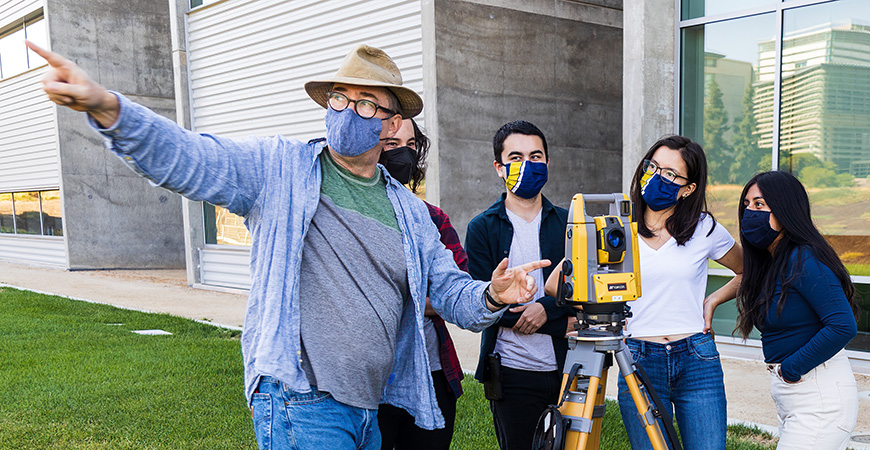
Civil Engineering Program Educational Objectives and Student Outcomes
The B.S. degree in Civil Engineering (CE) will be offered by the School of Engineering through the Civil and Environmental Engineering (CEE) Department faculty.
Program Educational Objectives
The program will be consistent with UC Merced degree hallmarks, producing program graduates who will meet the following Program Educational Objectives:
- Critical Thinking: Apply a strong disciplinary foundation and engage in interdisciplinary thinking to approach challenges with an inquiry-based mindset, to critically assess problems, and to create sustainable solutions.
- Professional Development: Demonstrate initiative, respond to challenges with resiliency, learn from failure, and take responsibility for their ongoing education, skill enhancement, and lifelong learning.
- Leadership: Develop leadership, communication, and teamwork skills to effectively assume increasing levels of engineering responsibility, including pursuit of licensure where appropriate.
- Social Responsibility: Understand and contribute to both local and global communities, respect and value differing perspectives and experiences, act ethically, and actively respond to the needs of society.
Program Learning Outcomes
While not currently ABET accredited, the civil engineering program is following the criteria for the national engineering accreditation (ABET) Student Outcomes while remaining consistent with our institutional Program Educational Objectives.
From this perspective, our CE graduates are expected to achieve a set of student outcomes outlined by ABET (www.abet.org) by demonstrating:
- An ability to identify, formulate, and solve complex engineering problems by applying principles of engineering, science, and mathematics;
- An ability to apply engineering design to produce solutions that meet specific needs with consideration of public health, safety, and welfare, as well as global, cultural, social, environmental, and economic factors;
- An ability to communicate effectively with a range of audiences;
- An ability to recognize ethical and professional responsibilities in engineering situations and make informed judgments, which must consider the impact of engineering solutions in global, economic, environmental, and societal context;
- An ability to function effectively on a team whose members together provide leadership, create a collaborative environment, establish goals, plan tasks, and meet objectives;
- An ability to develop and conduct appropriate experimentation, analyze and interpret data, and use engineering judgment to draw conclusions;
- An ability to acquire and apply new knowledge as needed, using appropriate learning strategies.
In addition to the seven general PLOs above, the program also follows specific curriculum content [ABET Criteria for Accrediting Engineering Programs, 2025 – 2026]:
a) Application of:
i. mathematics through differential equations, probability and statistics, calculus-based physics, chemistry, and either computer science, data science, or an additional area of basic science
ii. engineering mechanics, materials science, and numerical methods relevant to civil engineering
iii. principles of sustainability, risk, and resilience to civil engineering problems
iv. the engineering design process in at least two civil engineering contexts
v. an engineering code of ethics to ethical dilemmas
b) Solution of complex engineering problems in at least four specialty areas appropriate to civil engineering
c) Conduct experiments in at least two civil engineering contexts and reporting of results
d) Explanation of:
i. concepts and principles in project management and engineering economics
ii. professional attitudes and responsibilities of a civil engineer, including licensure and safety
Resources
- Program enrollment and graduation data are available on the Institutional Planning and Analysis website at the following links: (enrollment table) (graduation table)
- Visit the Registrar office for the latest catalog and School of Engineering courses.
Vers. 3/25/25 - dbq



